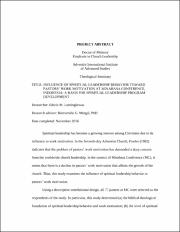| dc.contributor.author | Lumingkewas, Edwin M. | |
| dc.date.accessioned | 2020-07-22T00:41:53Z | |
| dc.date.available | 2020-07-22T00:41:53Z | |
| dc.date.issued | 2016-11 | |
| dc.identifier.uri | https://dspace.aiias.edu/xmlui/handle/20.500.12977/69 | |
| dc.description | Unpublished Project (DMin)
Shelf Location: BV652.1 .L85 2016 ATDC | en_US |
| dc.description.abstract | Spiritual leadership has become a growing interest among Christians due to its influence to work motivation. In the Seventh-day Adventist Church, Fowler (1982) indicates that the problem of pastors‟ work motivation has demanded a deep concern from the worldwide church leadership. In the context of Minahasa Conference (MC), it seems that there is a decline in pastors‟ work motivation that affects the growth of the church. Thus, this study examines the influence of spiritual leadership behavior to pastors‟ work motivation.
Using a descriptive-correlational design, all 77 pastors at MC were selected as the respondents of the study. In particular, this study determined (a) the biblical-theological foundation of spiritual leadership behavior and work motivation; (b) the level of spiritual
leadership behavior of MC leaders; (c) the extent of pastors‟ work motivation; (d) the significant relationship between the leaders‟ spiritual leadership behavior and pastors‟ work motivation at MC; (e) the significant difference in pastors‟ work motivation considering the demographic variables; (f) the predictors of pastors‟ work motivation; and (g) the developed program for MC.
Using descriptive statistics, the result shows that all the dimensions of spiritual leadership behavior of MC leaders have a high level except integrity which has only an average level. In the extent of pastors‟ work motivation, commitment is high while satisfaction and productivity are average. Using Pearson‟s correlation, the result shows that all the dimensions of spiritual leadership behavior are significantly correlated to satisfaction and commitment. Only spirituality and compassion are significantly correlated to productivity. Moreover, there is a statistically significant positive relationship (r = 0.830, p < .001) between the leaders‟ spiritual leadership behavior and pastors‟ work motivation at MC. There is also a significant difference between pastors‟ work motivation (commitment and productivity) and ministerial credential.
Using multiple regression, the result shows that ministerial credential, compassion, spirituality, and trust help predict pastors‟ work motivation. For each dimension, the predictors are trust and humility (satisfaction); ministerial credential, unity, and spirituality (commitment); and ministerial credential, compassion, unity, and spirituality (productivity). These findings and the review of biblical-theological and theoretical foundations of spiritual leadership behavior and pastors‟ work motivation lead to the development of the spiritual leadership program for MC. The program is designed
with trainings and guiding principles to help MC leaders enhance their spiritual leadership behavior that influences pastors‟ work motivation. | en_US |
| dc.language.iso | en_US | en_US |
| dc.publisher | Adventist International Institute of Advanced Studies | en_US |
| dc.subject | Christian leadership -- Church Leadership and Administration. | en_US |
| dc.subject | Church management -- Organizational Behavior. | en_US |
| dc.subject | Christian leadership. | en_US |
| dc.subject | Leadership -- Religious aspects -- Christianity. | en_US |
| dc.subject | Christian leadership -- Leadership Development. | en_US |
| dc.subject | Christian leadership -- Seventh-day Adventists. | en_US |
| dc.subject | Leadership -- Religious aspects -- Christianity. | en_US |
| dc.subject | Church personnel management. | en_US |
| dc.title | Influence of spiritual leadership behavior toward pastors' work motivation at Minahasa Conference, Indonesia : a basis for spiritual leadership program development | en_US |
| dc.type | Project | en_US |

